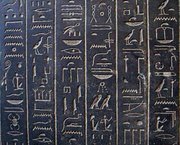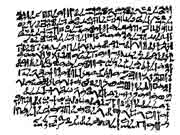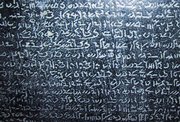
FAIR is a non-profit organization dedicated to providing well-documented answers to criticisms of the doctrine, practice, and history of The Church of Jesus Christ of Latter-day Saints.
No edit summary |
(mod) |
||
| Line 1: | Line 1: | ||
{{Articles FAIR copyright}} {{Articles Header 1}} {{Articles Header 2}} {{Articles Header 3}} {{Articles Header 4}} {{Articles Header 5}} {{Articles Header 6}} {{Articles Header 7}} {{Articles Header 8}} {{Articles Header 9}} {{Articles Header 10}} | {{Articles FAIR copyright}} {{Articles Header 1}} {{Articles Header 2}} {{Articles Header 3}} {{Articles Header 4}} {{Articles Header 5}} {{Articles Header 6}} {{Articles Header 7}} {{Articles Header 8}} {{Articles Header 9}} {{Articles Header 10}} | ||
= | {{Resource Title|What is "reformed Egyptian"?}} | ||
=={{Criticism label}} | == == | ||
{{Criticism label}} | |||
Critics claim that | Critics claim that | ||
* Jews or Israelites (like the Nephites) would not have used the language of their slave period — Egyptian — to write sacred records. | * Jews or Israelites (like the Nephites) would not have used the language of their slave period — Egyptian — to write sacred records. | ||
| Line 8: | Line 10: | ||
{{CriticalSources}} | {{CriticalSources}} | ||
=={{Conclusion label}} | == == | ||
{{Conclusion label}} | |||
There was a clear evolution of Egyptian script in the Old World, and these modified scripts were in use in Lehi's day. People of Lehi's time and place did use both Hebrew and Egyptian, just as Nephi claimed (See [http://scriptures.lds.org/1_ne/1/2#2 1 Nephi 1:2]). | There was a clear evolution of Egyptian script in the Old World, and these modified scripts were in use in Lehi's day. People of Lehi's time and place did use both Hebrew and Egyptian, just as Nephi claimed (See [http://scriptures.lds.org/1_ne/1/2#2 1 Nephi 1:2]). | ||
=={{Subarticles label}} | == == | ||
{{Subarticles label}} | |||
{{SummaryItem | {{SummaryItem | ||
|link=Book of Mormon/Anachronisms/Language/Reformed Egyptian/Egyptian too bulky | |link=Book of Mormon/Anachronisms/Language/Reformed Egyptian/Egyptian too bulky | ||
Critics claim that
To see citations to the critical sources for these claims, [[../CriticalSources|click here]]
There was a clear evolution of Egyptian script in the Old World, and these modified scripts were in use in Lehi's day. People of Lehi's time and place did use both Hebrew and Egyptian, just as Nephi claimed (See 1 Nephi 1:2).



The claim that Israelites would not use Egyptian is clearly false. By the ninth to sixth centuries before Christ, Israelites used Egyptian numerals mingled with Hebrew text. The Papyrus Amherst 63 contains a text of Psalms 20:2-6 written in Aramaic (the language of Jesus) using Egyptian characters. This text was originally dated to the second century B.C., but this has since been extended to the 4th century B.C.[1]
Anti-Mormon authors Ankerberg and Weldon claim:
They are, however, spectacularly wrong, and "Mormonism" has explained why repeatedly:
Moroni makes it clear that "reformed Egyptian" is the name which the Nephites have given to a script based upon Egyptian characters, and modified over the course of a thousand years (See Mormon 9:32). So, it is no surprise that Egyptians or Jews have no script called "reformed Egyptian," as this was a Nephite term.
There are, however, several variant Egyptian scripts which are "reformed" or altered from their earlier form. Hugh Nibley and others have pointed out that the change from Egyptian hieroglyphics, to hieratic, to demotic is a good description of Egyptian being "reformed." By 600 BC, hieratic was used primarily for religious texts, while demotic was used for daily use.off-site
One can see how hieroglyphics developed into the more stylized hieratic, and this process continued with the demotic:

What could be a better term for this than an Egyptian script that has been "reformed"?
More recent research provides further corroboration:
William Hamblin provides additional example of such reformation of Egyptian, including:
Given that Moroni says the Nephites then modified the scripts further, "reformed Egyptian" is an elegant description of both the Old World phenomenon, and what Moroni says happened among the Nephites.
<videoflash>H8TXk-QiS6I</videoflash>
== Notes ==
The best article(s) to read next on this topic is/are:

FAIR is a non-profit organization dedicated to providing well-documented answers to criticisms of the doctrine, practice, and history of The Church of Jesus Christ of Latter-day Saints.
We are a volunteer organization. We invite you to give back.
Donate Now